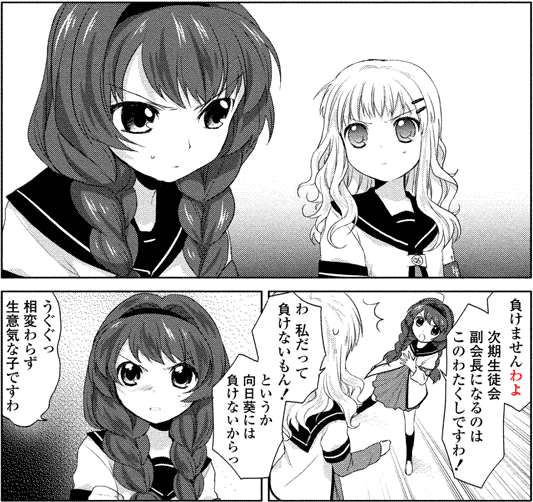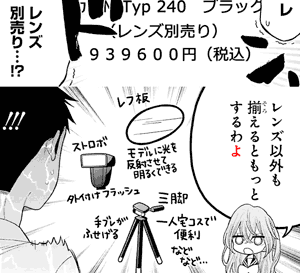In Japanese, wa yo わよ is a combination of two sentence-ending particles: wa わ, generally used by women, used to voice one's decision, surprise, conclusion, or opinion, and yo よ, used when correcting someone or informing, alerting them of something. In manga and anime, it's typically used by "rich girl," ojousama お嬢様 characters speaking in polite language: desu wa yo ですわよ, ~masu wa yo ますわよ, ~masen wa yo ませんわよ.
Grammar
See the articles about the wa わ particle and yo よ particle for grammar. This article is mostly for the examples.
In summary, a sentence with wa yo わよ literally combines the effect of wa わ with the effect of yo よ, both of which are difficult to explain in separate, so no way I'll do both at once together. Basically:
- Context: someone proposes a risky idea to solve a problem.
- sonna koto shitara shinu wa
そんなことしたら死ぬわ
If [you] do something like that, [you] will die.- This sentence vocalizes one's shock or surprise in response.
- sonna koto shitara shinu yo
そんあことしたら死ぬよ
- This sentence urges the listener to pay attention to the danger of the proposal and change his mind.
- sonna koto shitara shinu wa yo
そんなことしたら死ぬわよ
- This sentence does both things.
The limitations of both particles also apply. It's not possible to use yo よ in contexts that don't warrant it. And it's not possible to use wa わ with questions and hortatives, even though you could use yo よ in such cases.
Examples
- Context: Furutani Himawari 古谷向日葵 competes with Oomuro Sakurako 大室櫻子 for the student council presidency.
- makemasen wa yo
負けませんわよ
[I] won't lose. - {jiki seitokai fukukaichou ni naru} no wa kono watakushi desu wa!
時期生徒会副会長になるのはこのわたくしですわ!
The one [who] {will become the next student council vice-president} is this me!
It's I [who] {will become the next student council vice-president}.- See also: kono ore da この俺だ.
- wa, watashi datte makenai mon!
わ 私だって負けないもん!
I-I won't lose [either]! - toiuka Himawari niwa makenai kara'
というか向日葵には負けないからっ
Or rather, [I] wouldn't lose to [you], Himawari. - ugugu'
うぐぐっ
*frustration* - aikawarazu {namaiki na} ko desu wa
相変わらず生意気な子ですわ
As always, [you] are an {impertinent} child. (literally.)
[You] are impertinent as always.
- Context: Gojou Wakana 五条新菜 looks up on the internet the price of a camera.
- kyuu-juu san man kyuu-sen roppyaku en (zei-komi)
939600円(税込)
Nine hundred thousand six hundred yen (with tax).- It's over 8000 dollars!
- zei-komi 税込み, "tax included," was spelled here between parentheses without okurigana.
- re, renzu betsu-uri...!?
レ レンズ別売り・・・!?
Lens sold separately...!? - {renzu igai mo soroeru} to motto suru wa yo
レンズ以外も揃えるともっとするわよ
{Plus other things besides the lens} [it] goes for even more.- It costs even more.
- soroeru - "to join in order to complete a set," in this case "adding" the other pieces of equipment makes it way more expensive.
- refu-ban, {moderu ni hikari wo hansha sasete} akaruku dekiru
レフ板 モデルに光を反射させて明るくできる
Reflector board: {by making light reflect on the model} [it] can make [the photo] brighter.- akaruku dekiru - eventivization akaruku suru conjugated to the potential dekiru.
- sutorobo, soto-dzuke furasshu
ストロボ 外付けフラッシュ
Strobe: external flash. - sankyaku, te-bure ga fusegeru, hitori taku-kosu de benri
三脚 手ブレがふせげる 一人宅コスで便利
Tripod: can stop trembling of hand, useful when cosplaying at home alone.- fusageru - potential of fusegu 防ぐ, "to block," "to prevent."
- nado nado
などなど
Et cetera et cetera.


No comments: